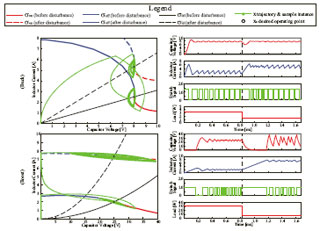Performance Limits of dc-dc Converters and Control
Grant Pitel with adviser Philip T. Krein
Switched electrical systems such as switch mode power supplies (SMPS) have response times limited by their time-dependent states: inductor current and capacitor voltage. Tight control over state response has a long history in dynamic power electronic applications that must track quick reference changes and reject various disturbances. Traditional control schemes commutate switches at fixed frequencies to make SMPS behave as linear systems and use linear feedback. This decision ultimately sacrifices some performance and robustness. Next-generation nonlinear control schemes and state-of-the-art embedded processors provide new ways to control SMPS without making the same sacrifices.
Concepts introduced previously have been developed into design tools and control algorithms and implemented on a digital signal processor. The most prominent result has been a control that enables an SMPS to recover from any detected system or control change using one commutation. This control law allows the supplies that experience large load changes, common to digital electronics, to respond robustly and with a speed limited only by its component values. One commutation response from a load step for a buck converter is shown in Figure 45.
This research was supported by the Grainger Endowments.
